BEST CPUs For RX 7900 XTX & RX 7900 XT
Introduction
The Power of AMD’s Flagship GPUs
The AMD Radeon RX 7900 XTX and RX 7900 XT represent the pinnacle of AMD’s RDNA 3 graphics architecture. Built to deliver exceptional 4K gaming performance, high refresh rate experiences, and advanced rendering capabilities, these GPUs are among the most powerful options on the market. Gamers and content creators who invest in either of these graphics cards expect uncompromising speed, smooth gameplay, and future-ready performance. However, the GPU alone cannot guarantee maximum efficiency—pairing it with the right CPU is critical.
Why the CPU Matters in a High-End Build
While the RX 7900 XTX and RX 7900 XT can handle demanding games and workloads with ease, they rely heavily on the CPU to process instructions, manage game logic, and eliminate potential bottlenecks. If the CPU isn’t powerful enough, it will restrict the GPU’s performance, preventing users from achieving the full potential of their graphics card. Conversely, choosing the right CPU ensures optimal frame rates, lower latency, and improved overall system responsiveness.
Striking the Balance: Performance vs. Value
Not every user needs the absolute top-of-the-line processor. The best CPU for the RX 7900 XTX or RX 7900 XT depends on the type of gaming and workload preferences. For instance, competitive esports players may prioritize high single-core performance to achieve maximum FPS, while creators and streamers may prefer CPUs with higher core counts for multitasking and rendering. Finding a balance between raw performance, future-proofing, and budget is essential when choosing the ideal processor.
AMD vs. Intel: The CPU Battle
Both AMD and Intel offer excellent CPUs that pair well with these flagship GPUs. AMD’s Ryzen 7000 and Ryzen 9000 series deliver outstanding multi-threaded efficiency, PCIe 5.0 support, and compatibility with the latest DDR5 memory. On the other hand, Intel’s 13th and 14th Gen Core processors excel in high clock speeds, single-core strength, and overall gaming performance. Each platform comes with its own strengths, and the final choice will depend on whether a gamer values raw FPS, multitasking ability, or platform features.
Avoiding Bottlenecks for 4K Gaming
At 4K resolution, most of the workload shifts to the GPU, which means CPU bottlenecking becomes less of a concern compared to 1080p or 1440p gaming. However, for users running high-refresh monitors (144Hz, 240Hz, or beyond) or engaging in CPU-heavy tasks like video editing, simulation games, or streaming, the processor still plays a crucial role. Ensuring that the CPU has enough cores, threads, and clock speed will prevent performance dips and stuttering in demanding scenarios.
Preparing for the Future
The RX 7900 XTX and RX 7900 XT are not short-term investments—they are designed to last for years of gaming and creative workloads. Choosing the right CPU ensures that the system remains relevant and powerful for future modern game releases and software advancements. By pairing these GPUs with a capable processor, users can build a balanced, future-proof PC that handles today’s most demanding titles while staying ready for tomorrow’s innovations.
Top CPUs For RX 7900 XTX & RX 7900 XT
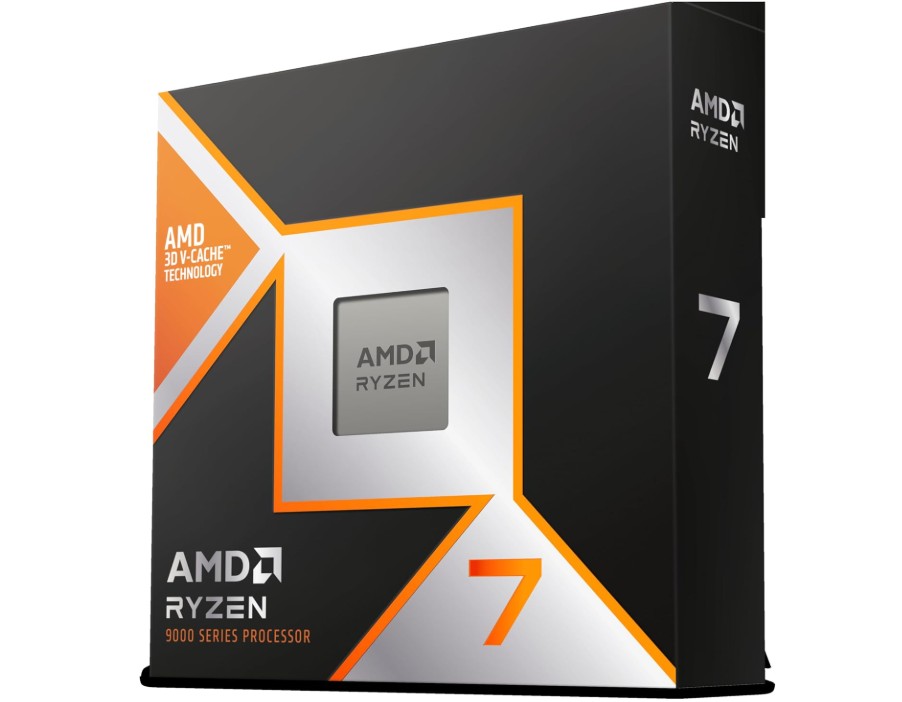
AMD RYZEN 7 9800X3D 8-Core, 16-Thread Desktop Processor
AMD RYZEN 7 9800X3D 8-Core, 16-Thread Desktop Processor
The AMD Ryzen 7 9800X3D is the latest addition to AMD’s Ryzen 9000 series lineup, built on the Zen 5 architecture and enhanced with AMD’s innovative 3D V-Cache technology. Designed specifically with gaming performance in mind, it delivers exceptional efficiency and responsiveness, making it an ideal CPU for high-end GPUs like the Radeon RX 7900 XTX and RX 7900 XT. With its 8-core, 16-thread configuration and massive 144MB cache, this processor strikes an excellent balance between raw gaming power and multitasking capabilities.
Gaming Performance with RX 7900 Series GPUs
When paired with the RX 7900 XTX or RX 7900 XT, the Ryzen 7 9800X3D truly shines. The extra cache provided by AMD’s 3D V-Cache technology dramatically reduces memory latency, resulting in smoother frame rates and improved consistency, especially in CPU-intensive titles like open-world RPGs and competitive esports games. For 1440p and 4K gaming, where the RX 7900 series excels, the 9800X3D ensures there is minimal to no bottlenecking, allowing gamers to unlock the full potential of their GPU.
Architectural Advancements: Zen 5 + 3D V-Cache
The Zen 5 architecture brings higher IPC (instructions per cycle) improvements, better efficiency, and faster clock speeds compared to its predecessors. The addition of 96MB of stacked L3 cache through AMD’s 3D V-Cache technology makes the Ryzen 7 9800X3D a gaming powerhouse. This large cache pool benefits games that rely heavily on quick data access, giving it a competitive edge over traditional CPUs with smaller caches.
Productivity and Multitasking Performance
While the Ryzen 7 9800X3D is optimized for gaming, its 8-core, 16-thread setup ensures strong performance in productivity tasks as well. Content creators, streamers, and professionals using applications like Adobe Premiere Pro, Blender, or DaVinci Resolve will appreciate its efficiency. However, if your primary workload leans more toward heavy multitasking or workstation-level rendering, a higher-core Ryzen 9 processor may provide better long-term value.
Power Efficiency and Cooling Considerations
With a default TDP of 120W, the Ryzen 7 9800X3D offers impressive energy efficiency for a high-performance CPU. Unlike previous generations, Zen 5 achieves better performance-per-watt, making it ideal for gaming rigs that prioritize thermal and power management. However, since it does not come with a stock cooler, investing in a high-quality air or liquid cooling solution is essential to maintain consistent performance under heavy loads.
Future-Proofing and Platform Support
The 9800X3D uses AMD’s AM5 socket, ensuring compatibility with DDR5 memory and PCIe 5.0 devices. This provides excellent future-proofing for upcoming technologies and high-speed storage solutions. When combined with the RX 7900 XTX or RX 7900 XT, users get a modern, balanced platform ready to handle the most demanding games and applications for years to come.
Verdict
The AMD Ryzen 7 9800X3D is a near-perfect CPU choice for gamers pairing their system with the RX 7900 XTX or RX 7900 XT. It delivers top-tier gaming performance, exceptional efficiency, and strong future-proofing thanks to Zen 5 and 3D V-Cache. While creators who need higher core counts may lean toward Ryzen 9 alternatives, the 9800X3D remains one of the best CPUs available for maximizing the performance of AMD’s flagship GPUs.
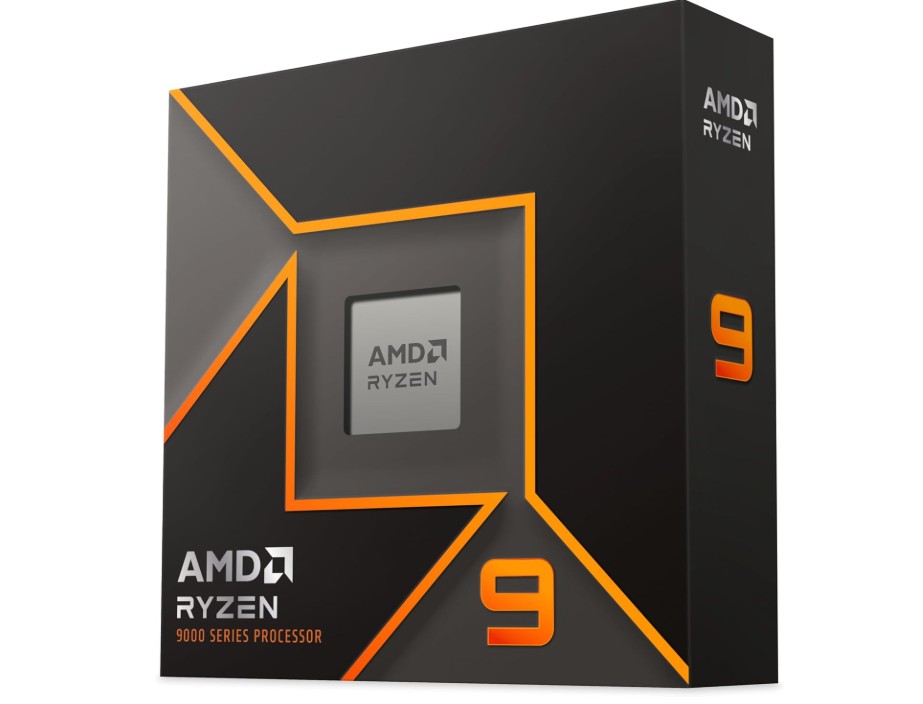
AMD Ryzen 9 9900X 12-Core, 24-Thread Unlocked Desktop Processor
AMD Ryzen 9 9900X 12-Core, 24-Thread Unlocked Desktop Processor
The AMD Ryzen 9 9900X is a 12-core, 24-thread powerhouse built on the latest Zen 5 architecture. Positioned in the Ryzen 9000 series lineup as a versatile and high-performance CPU, it targets gamers, content creators, and professionals who demand both speed and efficiency. When paired with AMD’s flagship GPUs—the Radeon RX 7900 XTX and RX 7900 XT—the Ryzen 9 9900X offers a well-rounded platform capable of handling modern gaming and productivity workloads with ease.
Gaming Performance with RX 7900 Series
The RX 7900 XTX and RX 7900 XT are built for 4K and high-refresh-rate gaming, and the Ryzen 9 9900X is more than capable of keeping up. Its high boost clock speed of up to 5.6 GHz ensures strong single-core performance, which is vital for maintaining smooth frame rates in competitive games. At higher resolutions like 1440p and 4K, the CPU provides a balanced match for these GPUs, eliminating potential bottlenecks and ensuring consistent performance across demanding titles.
Zen 5 Architectural Advantages
Built on AMD’s advanced Zen 5 architecture, the Ryzen 9 9900X delivers significant IPC (instructions per cycle) gains and improved efficiency over the previous generation. With 76MB of cache and PCIe 5.0 support, it offers lightning-fast data handling and seamless communication with the RX 7900 series GPUs. Combined with DDR5 memory compatibility, the architecture ensures faster load times, better multitasking, and overall improved responsiveness in both games and heavy workloads.
Productivity and Content Creation
One of the standout features of the Ryzen 9 9900X is its versatility. With 12 cores and 24 threads, it goes beyond gaming and delivers impressive performance in productivity tasks such as 3D rendering, video editing, software compiling, and streaming. When paired with the RX 7900 XTX or XT, creators benefit from a balanced setup that can handle GPU-accelerated workloads while the CPU manages background tasks efficiently. This makes it an excellent choice for gamers who also work with creative software or stream content.
Power Efficiency and Cooling
With a 120W TDP, the Ryzen 9 9900X is designed to provide high performance without being overly power-hungry. Zen 5’s improved efficiency ensures better performance-per-watt, making it easier to manage thermals compared to higher-core Ryzen 9 CPUs like the 9950X. However, since no cooler is included, users should invest in a robust aftermarket air or liquid cooling solution to maintain peak performance during intensive gaming or rendering sessions.
Future-Proofing and Platform Benefits
The Ryzen 9 9900X supports the AM5 platform, meaning users gain access to cutting-edge features like DDR5 memory and PCIe 5.0 storage and GPU connectivity. This ensures long-term compatibility with future upgrades and helps build a system that will remain relevant for years. When paired with the RX 7900 XTX or RX 7900 XT, the result is a future-proof gaming and productivity rig capable of handling upcoming games and software advancements.
Verdict
The AMD Ryzen 9 9900X is an outstanding CPU for gamers and creators who want a powerful yet balanced processor for their RX 7900 XTX or RX 7900 XT builds. It combines strong single-core performance for high-FPS gaming with ample multi-core power for content creation and multitasking. While those who require extreme core counts may consider the Ryzen 9 9950X, the 9900X remains an excellent choice for enthusiasts seeking the perfect middle ground of performance, efficiency, and value.
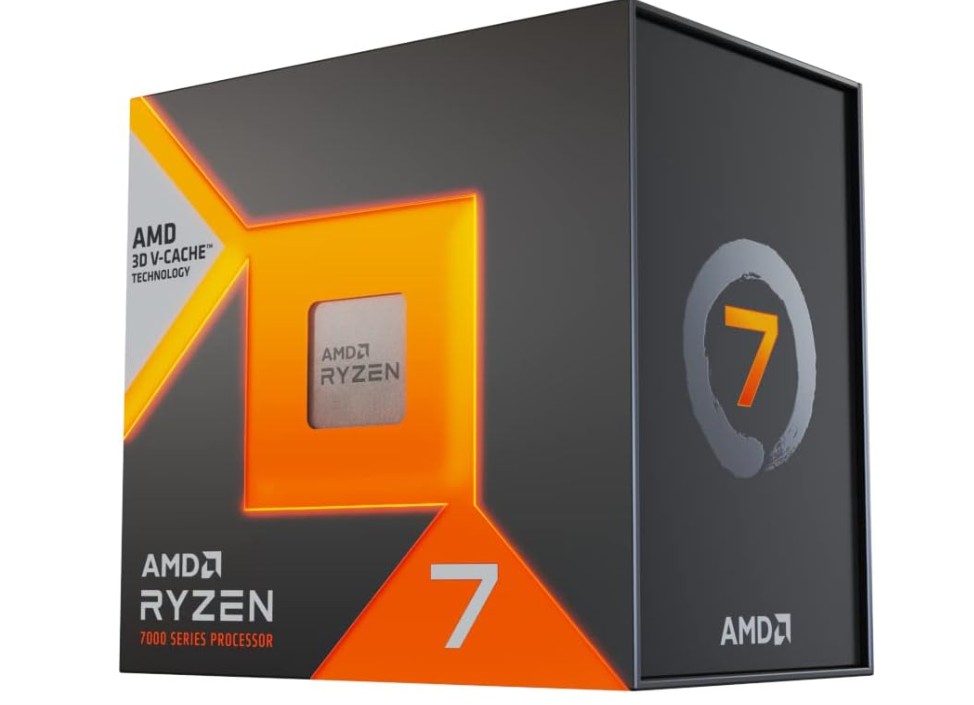
AMD Ryzen 7 7800X3D 8-Core, 16-Thread Desktop Processor
AMD Ryzen 7 7800X3D 8-Core, 16-Thread Desktop Processor
The AMD Ryzen 7 7800X3D, built on the Zen 4 architecture and equipped with AMD’s groundbreaking 3D V-Cache technology, is widely regarded as one of the best gaming CPUs available. With 8 cores, 16 threads, and a massive 104MB cache, it is specifically designed to maximize gaming performance by reducing memory latency and enhancing frame stability. For high-end GPUs like the RX 7900 XTX and RX 7900 XT, this CPU provides an exceptional balance of raw gaming power, efficiency, and value.
Gaming Performance with RX 7900 Series
When paired with the RX 7900 XTX or RX 7900 XT, the Ryzen 7 7800X3D delivers outstanding performance across all modern titles. Thanks to its 3D V-Cache, the processor excels in CPU-intensive and open-world games where large amounts of data need to be quickly accessed. At 1440p and especially at 4K, where these GPUs dominate, the 7800X3D ensures minimal bottlenecks, allowing gamers to enjoy smooth, high-refresh-rate gameplay with consistent frame pacing. This makes it an excellent choice for competitive esports players and high end gamers alike.
Zen 4 + 3D V-Cache Technology
The Zen 4 architecture brings efficiency and clock speed improvements over previous generations, while the 3D V-Cache adds an impressive 96MB of additional L3 cache. This unique feature gives the 7800X3D an edge in gaming, as it significantly lowers latency between the CPU and memory, boosting performance in titles where other processors may struggle. The result is a CPU that consistently ranks among the best for gaming, even compared to higher-core-count chips.
Productivity and Multitasking
While the Ryzen 7 7800X3D is primarily a gaming-focused processor, its 8 cores and 16 threads provide more than enough performance for productivity workloads. Tasks such as streaming, video editing, and light 3D rendering are handled efficiently. However, for professionals with heavy multitasking needs or frequent use of workstation-level applications, CPUs like the Ryzen 9 7900X or 9900X may be better suited. Still, for gamers who occasionally edit content or stream, the 7800X3D strikes a great balance.
Power Efficiency and Cooling
The 7800X3D has a 120W TDP, offering excellent performance-per-watt efficiency. Despite its powerful capabilities, it remains relatively cool compared to higher-core Ryzen CPUs, thanks to its architectural optimizations. That said, AMD does not include a stock cooler, so an aftermarket air cooler or liquid AIO is recommended to maintain optimal thermals and stable boost clocks, especially during extended gaming or productivity sessions.
Future-Proofing and Platform Benefits
As part of the AM5 platform, the Ryzen 7 7800X3D supports PCIe 5.0 and DDR5 memory, making it future-ready for upcoming technologies and storage solutions. Combined with the RX 7900 XTX or RX 7900 XT, gamers can build a system that not only excels today but is also well-prepared for future high-end games and demanding software releases.
Verdict
The AMD Ryzen 7 7800X3D is one of the best gaming CPUs on the market and a perfect partner for the RX 7900 XTX and RX 7900 XT. Its 3D V-Cache technology ensures top-tier gaming performance, while its efficient design keeps power consumption and thermals in check. Although professionals needing extreme multitasking may prefer Ryzen 9 options, the 7800X3D remains the ultimate choice for gamers who want to unlock the full potential of AMD’s flagship GPUs.
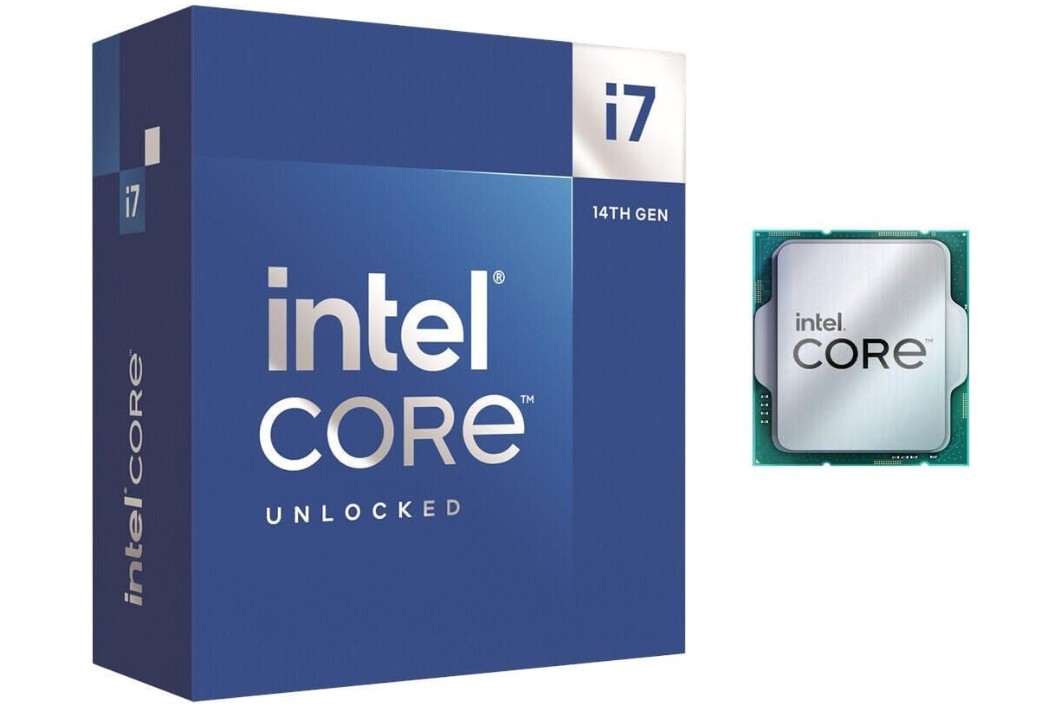
Intel Core i7-14700K New Gaming Desktop Processor
Intel Core i7-14700K New Gaming Desktop Processor
The Intel Core i7-14700K is one of Intel’s most well-rounded gaming and productivity processors, part of the 14th Gen “Raptor Lake Refresh” family. With 20 cores (8 performance-cores and 12 efficient-cores) and 28 threads, it sits between the i5-14600K and i9-14900K, offering an excellent balance of power and efficiency. For high-end GPUs like the Radeon RX 7900 XTX and RX 7900 XT, the i7-14700K provides the raw horsepower needed to deliver smooth frame rates in modern games while also excelling in multitasking and productivity workloads.
Gaming Performance with RX 7900 Series
Pairing the i7-14700K with the RX 7900 XTX or RX 7900 XT results in a system capable of handling even the most demanding titles at 1440p and 4K. With boost speeds reaching up to 5.6 GHz, the CPU delivers excellent single-core performance, which is critical for achieving high FPS in competitive games. At the same time, the 12 efficient cores ensure background processes and multitasking don’t interfere with gaming. This makes it a fantastic choice for gamers who want both high refresh rate performance and system stability.
Hybrid Architecture Advantages
The i7-14700K leverages Intel’s hybrid architecture, which combines powerful P-cores for heavy workloads with E-cores optimized for background efficiency. This design ensures better multitasking, smoother gameplay, and more efficient use of resources. Games that rely on high single-threaded performance benefit from the P-cores, while streaming, content creation, or background apps are seamlessly handled by the E-cores. When paired with the RX 7900 XTX or XT, this balance helps maximize the GPU’s output without introducing bottlenecks.
Productivity and Content Creation
Beyond gaming, the i7-14700K shines in productivity tasks. Its 20-core, 28-thread design gives it plenty of strength for workloads like video editing, 3D rendering, and software compiling. For gamers who also stream or work on creative projects, this CPU provides more headroom compared to 8-core CPUs like the Ryzen 7 7800X3D. The RX 7900 XTX or XT complements this well by accelerating GPU-heavy applications, while the i7-14700K manages the CPU-intensive side efficiently.
Power and Cooling Requirements
With a base power of 125W and a maximum turbo power of up to 253W, the i7-14700K is a high-performance chip that demands robust cooling. While it delivers fantastic performance, users must pair it with a capable aftermarket air or liquid cooler to avoid thermal throttling under heavy loads. Additionally, a strong power supply is recommended when pairing it with the RX 7900 series GPUs, as both CPU and GPU can draw significant power during peak performance.
Future-Proofing and Platform Benefits
The Core i7-14700K supports PCIe 5.0 for GPUs and storage devices, as well as DDR5 memory up to 5600 MT/s (with backward compatibility for DDR4). While AMD’s AM5 platform may offer longer socket support, Intel’s LGA 1700 still provides excellent flexibility for high-speed storage and next-generation gaming. Together with the RX 7900 XTX or XT, this CPU ensures a capable and future-ready build.
Verdict
The Intel Core i7-14700K is an excellent choice for gamers and creators pairing their system with the RX 7900 XTX or RX 7900 XT. It delivers strong single-core speed for gaming, high core counts for multitasking, and compatibility with cutting-edge technologies like PCIe 5.0 and DDR5. While it requires serious cooling and power management, its versatility makes it one of the best CPUs in its class for a balanced high-end build.
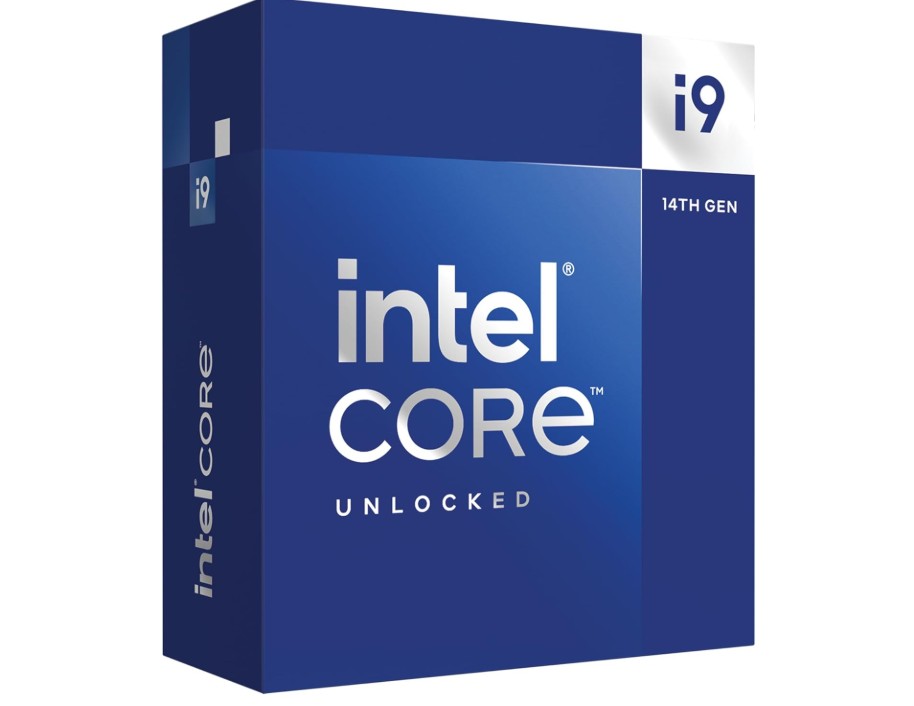
Intel Core i9-14900K Desktop Processor
Intel Core i9-14900K Desktop Processor
The Intel Core i9-14900K is Intel’s flagship 14th Gen “Raptor Lake Refresh” processor, designed to deliver uncompromising performance for gaming, content creation, and heavy multitasking. With 24 cores (8 Performance-cores and 16 Efficient-cores) and 32 threads, it represents the pinnacle of Intel’s hybrid architecture. When paired with AMD’s powerful GPUs—the RX 7900 XTX and RX 7900 XT—the i9-14900K creates an elite-tier system capable of handling everything from 4K gaming to professional workloads with ease.
Gaming Performance with RX 7900 Series
The i9-14900K is one of the fastest gaming CPUs on the market, thanks to its high boost clock of up to 6.0 GHz using Intel’s Thermal Velocity Boost. This extreme single-core speed ensures that even the most CPU-demanding games run smoothly at high refresh rates. When matched with the RX 7900 XTX or RX 7900 XT, gamers can expect top-tier performance in both 1440p and 4K, making this pairing ideal for enthusiasts with high-refresh monitors. For competitive esports titles, the processor’s strong single-thread performance helps achieve ultra-high FPS, ensuring every millisecond counts.
Hybrid Architecture and Performance Balance
Intel’s hybrid architecture combines powerful P-cores for heavy workloads and E-cores optimized for background efficiency. This design ensures that gaming remains fluid, even when multitasking with applications such as streaming software, browsers, or background recording tools. When paired with a high-end GPU like the RX 7900 series, the CPU ensures that the graphics card is never held back, allowing gamers to take full advantage of AMD’s flagship GPUs.
Productivity and Content Creation
Beyond gaming, the Core i9-14900K excels in productivity. With 24 cores and 32 threads, it is built to handle demanding workloads such as video editing, 3D rendering, AI tasks, and heavy multitasking. Professionals using software like Adobe Premiere Pro, Blender, or DaVinci Resolve will find the combination of this CPU and RX 7900 XTX/XT especially appealing, as it delivers both strong GPU acceleration and raw CPU horsepower. For streamers, the CPU ensures seamless multitasking, allowing simultaneous high-quality gaming, encoding, and broadcasting.
Power Consumption and Cooling Needs
While the i9-14900K offers incredible performance, it comes with high power demands. With a base power of 125W and turbo power reaching up to 253W, it requires a robust cooling solution to maintain peak performance without throttling. A high-end liquid AIO cooler or a premium air cooler is strongly recommended. Additionally, pairing this CPU with the RX 7900 XTX or XT means that users will need a high-quality power supply to ensure stability during demanding workloads.
Future-Proofing and Platform Features
The i9-14900K supports PCIe 5.0 and DDR5 memory up to 5600 MT/s, ensuring compatibility with next-generation storage and GPUs. It also retains backward compatibility with DDR4, making it versatile for a range of builds. While Intel’s LGA 1700 platform may not have the same longevity as AMD’s AM5, it still provides access to the latest technologies, ensuring gamers and creators are well-prepared for upcoming software and game releases.
Verdict
The Intel Core i9-14900K is an elite processor that pairs exceptionally well with the RX 7900 XTX and RX 7900 XT. It delivers unmatched gaming performance with its 6.0 GHz boost clock, outstanding multitasking capabilities, and professional-grade productivity performance. While it demands serious cooling and power delivery, enthusiasts seeking the absolute best experience from their AMD flagship GPU will find the i9-14900K to be a perfect match for a future-proof, high-performance system.
Buying Guide: Best CPUs for RX 7900 XTX & RX 7900 XT
The AMD Radeon RX 7900 XTX and RX 7900 XT are two of the most powerful GPUs available today, built on AMD’s RDNA 3 architecture. Designed for 4K gaming, high-refresh-rate esports, and heavy creative workloads, these GPUs can deliver incredible performance. However, the graphics card alone cannot determine the overall gaming experience. The CPU (central processing unit) plays an equally important role in ensuring the GPU performs at its maximum potential.
Choosing the right CPU for these flagship GPUs depends on your needs: do you prioritize high FPS in competitive games, 4K gaming, or content creation and productivity? This buying guide will walk you through everything you need to know—covering performance factors, bottleneck concerns, and the best CPU recommendations for different scenarios.
Key Factors When Choosing a CPU for RX 7900 XTX & RX 7900 XT
The AMD Radeon RX 7900 XTX and RX 7900 XT are among the most powerful GPUs on the market, built on AMD’s RDNA 3 architecture. These graphics cards deliver exceptional performance at 1440p and 4K, making them excellent choices for gamers, content creators, and professionals alike. However, to unlock their true potential, pairing them with the right CPU is crucial. A weak CPU can bottleneck these GPUs, limiting frame rates and productivity performance. Below, we’ll break down the key factors to consider when selecting a CPU for these high-end GPUs.
1. Performance Balance Between CPU and GPU
One of the most critical factors in building a balanced system is ensuring that your CPU does not bottleneck the GPU. The RX 7900 XTX and XT are designed for 4K and high-refresh 1440p gaming, which typically reduces CPU strain compared to lower resolutions. However, in competitive games and CPU-intensive titles like Cyberpunk 2077, Assassin’s Creed Valhalla, or Starfield, a strong CPU is essential.
- High-core-count CPUs (like Ryzen 9 9900X/9950X or Intel i9-14900K) provide smooth multitasking and future-proofing.
- Gaming-focused CPUs (like Ryzen 7 7800X3D/9800X3D) deliver unmatched FPS performance due to massive cache sizes and high boost clocks.
The choice depends on whether your priority is maximum gaming FPS or a balance of gaming + productivity.
2. Gaming vs Productivity Needs
Not all users have the same requirements. Some are pure gamers, while others also handle demanding workloads such as 3D rendering, streaming, or video editing.
- For Gamers → CPUs with strong single-core performance and high cache (Ryzen 7 7800X3D or 9800X3D) are ideal. These chips are optimized for gaming efficiency, keeping frame rates consistently high, especially when paired with RX 7900 XTX at 1440p or 4K.
- For Creators & Professionals → CPUs like Ryzen 9 9900X, 9950X, or Intel Core i9-14900K shine with high core/thread counts. They accelerate rendering, simulations, AI workloads, and video encoding while still maintaining strong gaming performance.
Defining your workload ensures you choose the CPU that maximizes your investment.
3. Resolution and Refresh Rate Target
The resolution you game at has a direct effect on how much CPU power you need.
- 1080p (High FPS/Esports) → CPU demand is highest at 1080p. Pairing the RX 7900 XTX/XT with a strong CPU like the Ryzen 7 7800X3D or Intel i7-14700K ensures the GPU isn’t held back.
- 1440p (Balanced Performance) → This is the sweet spot for the RX 7900 XT, where both GPU and CPU contribute significantly. A mid-to-high-end CPU with good IPC (instructions per cycle) ensures smooth performance.
- 4K (GPU Bound) → At 4K, the GPU does most of the heavy lifting, reducing CPU bottlenecks. Even so, a modern CPU like the Ryzen 9 9900X or i9-14900K ensures future-proofing and eliminates stutter in CPU-heavy games.
Your CPU choice should reflect the resolution and refresh rate you want to achieve.
4. Core Count and Thread Performance
Today’s CPUs come with a variety of core/thread configurations. For RX 7900 XTX & XT builds, this is a major consideration.
- 8-Core CPUs (e.g., Ryzen 7 7800X3D, 9800X3D) → Perfect for gaming; strong IPC and cache optimization make them excel in FPS.
- 12-16 Core CPUs (Ryzen 9 9900X, 9950X, Intel i9-14900K) → Ideal for gamers who also do productivity or multitasking.
- Hybrid Core CPUs (Intel 14th Gen) → Combine P-cores for performance and E-cores for efficiency, giving a strong balance of gaming + multitasking.
More cores help in multitasking and creative workloads, while fewer high-performance cores with large cache can still outperform in pure gaming.
5. Cache Size and Gaming Optimization
Cache is often an overlooked but critical factor in gaming performance. AMD’s 3D V-Cache technology (seen in Ryzen 7 7800X3D and 9800X3D) gives these CPUs a huge advantage in gaming, especially in CPU-intensive titles.
- Larger cache = reduced latency = higher FPS.
- Ryzen 7 7800X3D is widely considered one of the best gaming CPUs due to its 96MB L3 cache, which pairs beautifully with RX 7900 GPUs for high refresh rate gaming.
If gaming is your primary focus, CPUs with larger caches should be top of your list.
6. Overclocking and Boost Speeds
For enthusiasts, overclocking can squeeze out extra performance.
- Unlocked CPUs (Intel K-series and AMD Ryzen) allow manual tuning.
- High boost clock speeds (like Intel i9-14900K reaching 6.0 GHz) give better single-thread performance, which directly impacts gaming FPS.
- AMD’s X3D chips are limited in overclocking but excel with auto-boosting due to cache optimization.
If you enjoy tweaking performance, choose a CPU with strong overclocking potential.
7. Power Consumption and Cooling Requirements
High-performance CPUs demand excellent cooling and stable power delivery.
- Intel i9-14900K → Extremely powerful but power-hungry (up to 253W turbo). Requires a strong AIO liquid cooler or top-tier air cooler.
- AMD Ryzen 7 7800X3D/9800X3D → More power efficient (around 120W), making them easier to cool.
- Ryzen 9 9900X/9950X → Powerful multi-core CPUs that need robust cooling, especially under heavy workloads.
Pairing these CPUs with the RX 7900 XTX means a high-wattage PSU (850W–1000W) is recommended for stability.
8. Platform Longevity and Upgradability
When building a system, think about future upgrades.
- AMD AM5 Platform → Promised support until at least 2027, making it a strong choice for future CPU upgrades without changing the motherboard. Perfect if you plan to keep your RX 7900 series GPU for several years.
- Intel LGA 1700 → Nearing the end of its lifecycle, meaning fewer upgrade paths. Still powerful today, but less future-proof compared to AM5.
If long-term platform value matters, AMD has a clear advantage.
9. Memory and PCIe Support
Modern GPUs like the RX 7900 series benefit from the latest technologies.
- DDR5 Memory → Supported by both AMD AM5 and Intel 14th Gen. Offers faster speeds and lower latency.
- DDR4 Compatibility → Intel CPUs still support DDR4, which can lower build costs but sacrifices some performance.
- PCIe 5.0 → Both platforms support PCIe 5.0 for next-gen GPUs and NVMe SSDs. While the RX 7900 XT/XTX use PCIe 4.0, future GPUs will benefit from PCIe 5.0.
A CPU and motherboard combo with DDR5 + PCIe 5.0 ensures the best future-proofing.
10. Price-to-Performance Ratio
Finally, cost is always a deciding factor.
- Ryzen 7 7800X3D → Best value for pure gaming with RX 7900 XTX/XT.
- Ryzen 9 9900X / 9950X → Best for mixed gaming and productivity; higher price but strong future-proofing.
- Intel i7-14700K → Excellent mid-high tier option; balances gaming + multitasking well.
- Intel i9-14900K → Absolute performance king, but power-hungry and expensive.
The best CPU depends on your budget and whether you prioritize FPS in games or multi-core productivity.
FAQs – Best CPUs for RX 7900 XTX & RX 7900 XT
1. What is the best CPU for the RX 7900 XTX?
The AMD Ryzen 7 7800X3D is considered the best CPU for pure gaming performance when paired with the RX 7900 XTX. Its massive 3D V-Cache gives it exceptional gaming efficiency, ensuring minimal bottlenecks in both 1440p and 4K gaming.
2. Is the RX 7900 XT weaker than the RX 7900 XTX?
Yes, the RX 7900 XT is slightly less powerful than the RX 7900 XTX, with fewer compute units and lower performance. However, it still delivers excellent gaming results and is well-suited for 1440p high-refresh-rate gaming and solid 4K performance.
3. Do I need a high-end CPU for the RX 7900 XTX?
Yes, the RX 7900 XTX is a high-end GPU, so it benefits from pairing with a powerful CPU like the Ryzen 7 7800X3D, Ryzen 9 9900X, Ryzen 9 7950X3D, or Intel Core i9-14900K. A weaker CPU may bottleneck the GPU, especially in CPU-intensive games.
4. Is Intel or AMD better for RX 7900 series GPUs?
Both work well, but AMD Ryzen 3D V-Cache CPUs (like the 7800X3D) generally provide the best gaming performance. Intel CPUs like the Core i7-14700K and Core i9-14900K offer great all-round performance, especially for multitasking and productivity alongside gaming.
5. Will the RX 7900 XTX bottleneck with Ryzen 5 CPUs?
Yes, in most cases. Ryzen 5 CPUs (like the 7600) may bottleneck the RX 7900 XTX in CPU-heavy games, especially at 1080p. While playable, you won’t maximize the GPU’s potential. A Ryzen 7 or Ryzen 9 is a better choice.
6. Is DDR5 necessary when building with RX 7900 GPUs?
While not strictly necessary (some CPUs and motherboards still support DDR4), DDR5 is highly recommended for future-proofing and maximizing performance. High-frequency DDR5 memory (6000+ MHz) works best with Ryzen 7000/9000 and Intel 14th Gen CPUs.
7. Do I need overclocking to get the best performance?
Not necessarily. CPUs like the Ryzen 7 7800X3D cannot be overclocked in the traditional sense but still deliver outstanding gaming performance. Intel’s unlocked CPUs (like the i9-14900K) benefit from overclocking, but high-end cooling is required.
8. What PSU is recommended for RX 7900 XTX & XT with high-end CPUs?
A minimum of 850W is recommended for RX 7900 XT builds, while 1000W+ is recommended for RX 7900 XTX builds paired with high-end CPUs like Ryzen 9 or Intel i9. Always choose a high-quality PSU (80+ Gold or better).
9. Is the RX 7900 XTX good for 4K gaming with these CPUs?
Yes, the RX 7900 XTX is built for 4K gaming, and when paired with CPUs like the Ryzen 7 7800X3D or Intel i9-14900K, it provides smooth frame rates in high-endgames. The RX 7900 XT is also capable of 4K but shines more at 1440p high-refresh gaming.
10. Which CPU is most future-proof with RX 7900 GPUs?
For gaming, the Ryzen 7 7800X3D and upcoming Ryzen 9 9800X3D are highly future-proof due to their cache advantage. For gaming + productivity, the Ryzen 9 9900X/7950X3D or Intel i9-14900K are the best long-term investments.
Conclusion
Choosing the right CPU for the RX 7900 XTX or RX 7900 XT is about balance. If you are a hardcore gamer, CPUs like the Ryzen 7 7800X3D or 9800X3D are unbeatable for FPS performance. If you are a creator or multitasker, CPUs like the Ryzen 9 9900X, 9950X, or Intel i9-14900K give you the core strength for productivity while still delivering excellent gaming performance.
Key factors like core count, cache size, cooling, platform longevity, and budget should guide your decision. With the right CPU, you can ensure your RX 7900 XTX or XT runs at full potential, delivering cutting-edge performance for years to come.
A passionate tech enthusiast with a deep interest in the latest innovations, gadgets, and emerging technologies. Always eager to explore cutting-edge hardware and software, I enjoy sharing insights, reviews, and recommendations to help others make informed decisions in the ever-evolving tech world. With a curious mindset and hands-on approach, I stay up-to-date with industry trends, from PCs and gaming to mobile devices and AI-driven tools.






